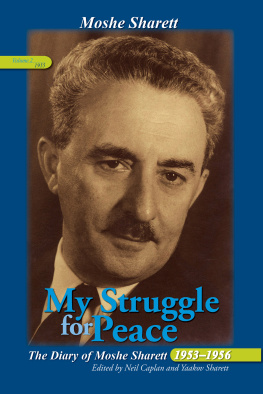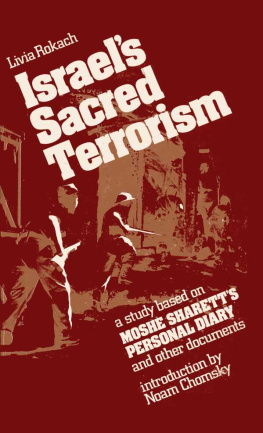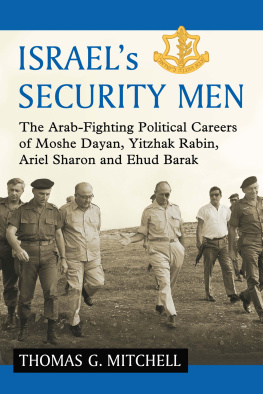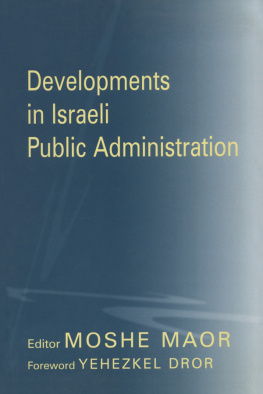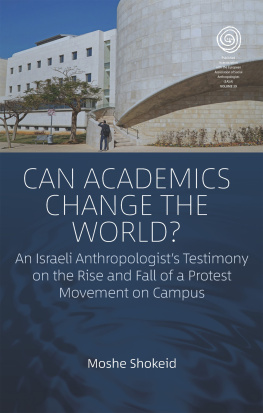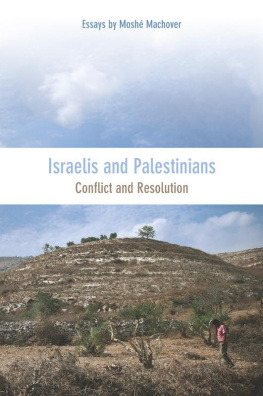
My Struggle
for Peace
The Diary of Moshe Sharett 1953-1956
Volume 2
January - December 1955
Edited by
Neil Caplan and Yaakov Sharett
Translation from the Hebrew
Yaakov Sharett and Neil Caplan
INDIANA UNIVERSITY PRESS
BLOOMINGTON AND INDIANAPOLIS
Publication of this English edition of
Moshe Sharett, Yoman Ishi (1978) was initiated by
The Moshe Sharett Heritage Society (MSHS)
30 Ben-gurion Blvd., Tel aviv, Israel 6458805

www.sharett.org.il
Cover and Graphic Design by Adi Chen
The MSHS and Indiana University Press gratefully acknowledge the generous support of the Israel Institute, Washington DC.

www.israelinstitute.org
2019 Indiana University Press
All rights reserved
No part of this book may be reproduced or utilized in any form or by any means, electronic or mechanical, including photocopying and recording, or by any information storage and retrieval system, without permission in writing from the publisher.
Manufactured in the United States of America.
Cataloging information is available from the Library of Congress.
ISBN 978-0-253-04325-2 (cloth, 3-vol. set)
ISBN 978-0-253-03735-0 (cloth, vol. 1)
ISBN 978-0-253-03758-9 (cloth, vol. 2)
ISBN 978-0-253-03762-6 (cloth, vol. 3)
ISBN 978-0-253-03738-1 (ebook, vol. 1)
ISBN 978-0-253-03761-9 (ebook, vol. 2)
ISBN 978-0-253-03763-3 (ebook, vol. 3)
1 2 3 4 524 23 22 21 20 19
A List of persons cited by their first name and mini-glossary of terms appears on page viii of Volume 1.
A List of Abbreviations appears on page x of Volume 1.
Table of contents
1955
Dbcle in Egypt
Saturday, January 1
[No diary entry found for this date.]
Sunday, January 2
I am renewing my diary writing after who-knows-how-many months of cessation, which caused me deep frustration, but which I have not found the energy to overcome. I do have the skeleton of events I wrote down daily, and I have not given up hope of filling in the gaps. But who knows if and when I will find the time necessary for this and if my memory wont fail me when I try to revive it all. It seems only the protruding events have remained intact while the colors and experiences have become dull or have even been erased completely.
Two decisions are going to fall this week: the verdict in the trial of the ten Jews in Cairo and the resolution of the Security Council debate in the matter of the Bat Galim. As regards the trial, we have received worse news than what we had before and decided to take up vigorous measures again. This morning Gideon Rafael set out for Paris once again for the purpose of this affair, and yesterday I wired London to ask Orbach to come to Paris and be prepared to fly immediately to Cairo.
The press is overflowing with the details of the story told by the captain and the nine sailors of the Bat Galim who were returned to Israel yesterday. [- - -]
Before the Cabinet meeting, Yosef Tekoah summarized for me his conclusions of the Bat Galim affair in light of the return of the crew. Even though Joe could easily have reached a completely negative assessment of the entire operation, having had no part in the decision to send the boat, he a sensible observer and
[- - -]
At the last moment before the opening of the Cabinet meeting, Eshkol entered the meeting room, followed immediately by Lavon. Evidently, Eshkol wanted to talk in private, but that became impossible. He voiced a strong appeal against my establishing a commission of inquiry.
The consequences, he said, would be most disastrous. Dayan has apparently managed to explain the matter to him from his point of view. I rejected his critical response both in principle and in practice. The inquiry begins this afternoon.
In the course of the Cabinet meeting, I signed the instrument of authority which I had drawn up last evening and [my secretary] Shamai copied them by hand. Lavon asked to see them and I assented. There remained a paragraph in the above document making it obligatory to draw my attention to defects in the apparatus of command and the political control over it. I was sure that this would suffice for the commission to spread its net.
Most of the Cabinet meeting was swallowed up by an argument about the Law of Inheritance. The religious Ministers are satisfied with the minimum: they are not demanding the delegation of all matters of inheritance within the rabbinical authorities, but insist on making it possible for those interested to have their matters brought before a rabbinical court. Our Ministers and [Pinhas] Rosen vehemently opposed this: We are a modern state. In all properly governed states, including Turkey, Pakistan and Egypt, inheritance matters were taken out from the hands of religious courts and handed over to civil courts. It is just impossible that we shall have two parallel juridical systems. What about the status of women? I suggested we postpone a
In the afternoon there was a consultation at my home on the matter of the [planned] Israeli delegation to China, headed by David Hacohen, and the implications of this move for our relations with the US. The consensus was not to postpone the trip which was scheduled for the last week in January. The delegation would look into trade possibilities in Rangoon too, and also visit Thailand and the Philippines. All this is to impart greater scope to the trip and slightly blunt the Chinese sting therein. I suggested that we emphasize in the press that the boycott enacted against us by the [organizers of the] Conference of Asian and African Nations [which would convene in April in Bandung, Indonesia] made it even more imperative for us to develop our contacts with China. The Americans have to be told that, facing such extensive isolation, we cannot be expected to sentence ourselves to additional isolation of our own accord. Walter voiced his opinion that Nehrus defense of our right to take part in the [scheduled] conference, which hed expressed both in Jakarta and at the press conference in Calcutta on his return to New Delhi, was likely to hasten the establishment of diplomatic contacts between ourselves and India. Would that it be so. The truth is that Nehru has gotten himself tangled up in a moral contradiction by defending our right of equality vis--vis other nations while denying us this same right in our relations with his own country.
For dinner at home, in our kitchen, Charles Shulman, a Reform Rabbi from New York, active in the UJA and an old friend. A good chap but and endless talker. I learned from him that the very same Henry Crown, who had visited me a few months ago, is so heavy with money that he may be the richest Jew on Earth Charles is breaking his head over how to warm Crowns heart.
[- - -]
Pinhas Sapir renewed Eshkols protest over the inquiry into the Cairo mess. Harsh words were exchanged between us. I resolutely announced that I was not willing to bear the responsibility for the unruly situation which had arisen without an authoritative inquiry which I could trust. The fear that, as a result of this [commission], the terrible relations pervading the defense leadership and the criminal allegations bandied about there by one and all would become public knowledge does not hold water. And this, not because this fear is unfounded, but because such is the reality and the absence of an inquiry would not remedy the ill; it would only constitute a scandal in its own right. Golda supported me with all her vigor. She related that, two weeks ago, she had already demanded that I launch an inquiry, and that I had answered that I was postponing it until after the trial in Cairo. In an aside she said that she had been highly impressed by my behavior during the whole course of dealing with the affair of the trial, not having busied myself with internal accusations, which it would have been my right to do, but having devoted myself entirely to saving the accused from the danger of hanging.
Next page
